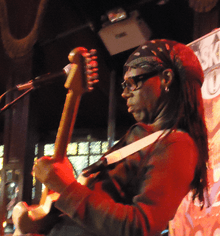
Rodgers work includes over 300 million albums and 75 million singles sold, much of this as a collaborator or producer. In his acceptance speech he shared that with “Every record I produce, I join the band; I try to make every artist believe I have their best interest at heart.” And based on the great success of so many, the formula seems to work. What a gift.
His comments resonated for me as a coach and I share this example as a way of answering a question I hear regularly: “How does coaching work?”
For me, it is largely behind the scenes support, letting the client shine, with some expertise thrown in where it can facilitate the process and/or strengthen the outcomes. I rely on the power of questioning and believe in the coaching philosophy that reasonably healthy people can figure out their issues through a process that empowers them to find solutions for challenges.
A critical aspect of coaching is helping the client focus on what they want to be doing. This future orientation is a way that coaching differs from therapy which can be more oriented in the past.
Beyond that, it depends. It depends on the client’s situation and goals. I may ask someone I’m working with to do an assessment or exercises or development planning. My clients are usually focused on career development or growing as leader and sometimes coaching may include identifying strengths, brainstorming opportunities, personal branding, networking, or testing and trying options. I often share books, research, articles, and/or videos. Every coaching engagement is tailored to the needs of the individual, keeping the client at the heart of the process and me keeping out of sight.
This along with providing opportunities for reflection, challenging limiting beliefs, and being an accountability partner is my strategy as a coach
I also believe that behind the scenes is how some of the best managers and supervisors operate as well. Their work and focus is supporting the success of their direct reports, their team. This style is known as a servant leader philosophy.
Final thought: music connects us with others and these days, anything that increases understanding is good, right? Plus, playing it and even listening to it is an activity that engages all areas of the brain. Interesting.
Any thoughts on behind the scenes support, music, and/or servant leadership? You can comment below.
Leave a Reply